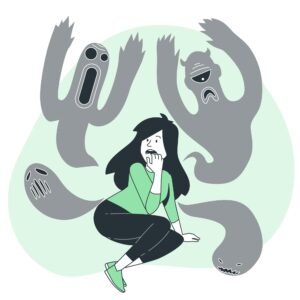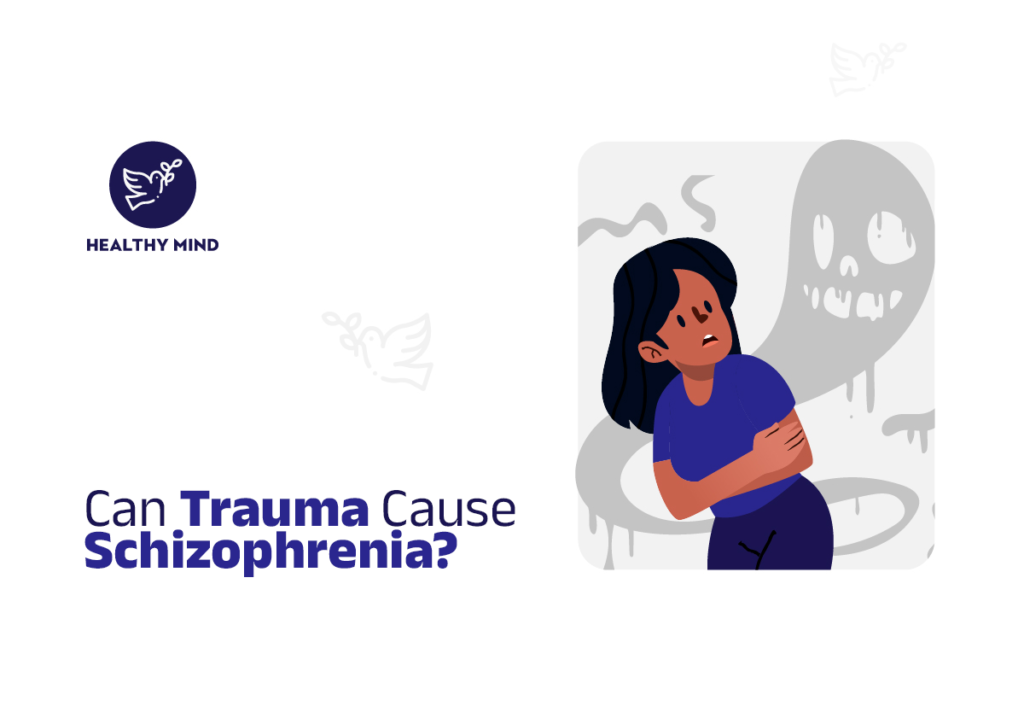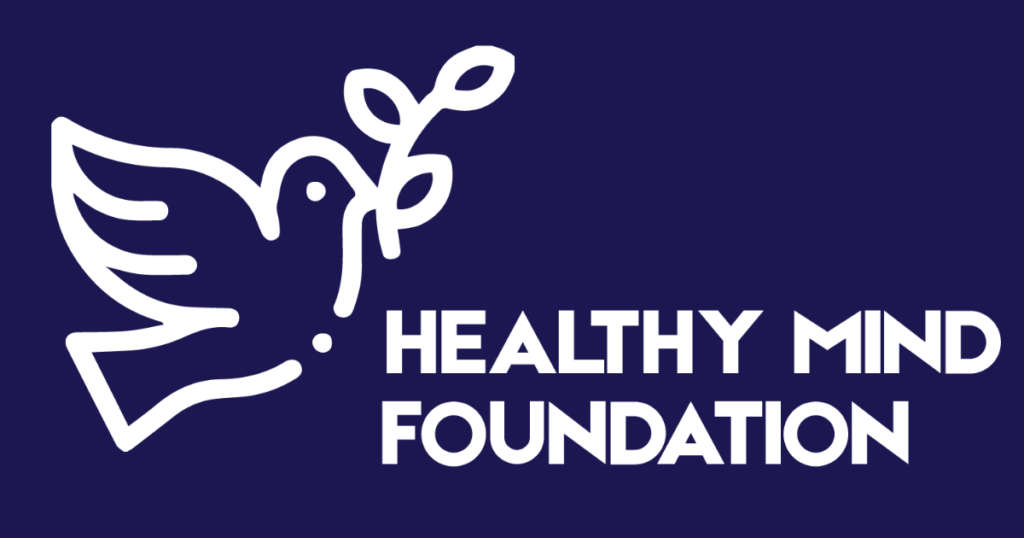There may be a link between schizophrenia and trauma. Some people may be more likely to go through trauma, especially as children, if they are genetically more likely to develop psychosis or schizophrenia.
Physical changes can happen after trauma, which may raise a person’s risk of developing mental illnesses like schizophrenia.
People who are more likely to get schizophrenia may get it after a traumatic event.
At Healthy Mind Maryland, you can get our service for Trauma Management, our therapists can help you cope with trauma.
Let’s talk about the connection between schizophrenia and trauma.
Find out: can schizophrenia be caused by a traumatic event?
What is Schizophrenia?

When you have schizophrenia, your thoughts, feelings, and actions are all skewed. It might make you hear voices or think things that are not true. It can be hard to go about your daily life and connect with other people when you have schizophrenia.
There are three main groups of illness symptoms:
1.Psychotic symptoms: These change the way you think and see things, causing you to lose touch with reality. You might think or hear things that are not true, or you might see or hear things that are not there.
2.Negative symptoms: These make you feel bad and make it hard to do normal things. You may be depressed, have trouble enjoying life, or have trouble getting along with other people.
3.Cognitive symptoms affect the way you think, including your memory and ability to pay attention. It is not always easy to decide what to do or stay focused.
Several things can make the chance of getting schizophrenia higher:
1.Genes: It can run in families, but there is not just one gene that causes it. The disorder may be caused by a lot of different genes.
2.Brain structure and function: Some people with schizophrenia have differences in the parts of their brain or the connections between them that may start before they are born.
3.Environment: Genes and life experiences can work together to make a difference. The risk can go up if you are exposed to viruses, trauma, or stressful events, especially when you are young.
Mental illness can affect your life or the lives of others. Knowing these risk factors and symptoms can help you recognize and deal with its effects.
What is Trauma?
Trauma is not just hurt bodies or combat. It can be any event that makes you feel scared, threatened, or helpless.
This includes things like getting hurt, getting sick, or losing someone you care about.
It is hard for everyone, but it is especially hard for kids who are still learning how to handle their feelings. It is sad that a lot of people have hard times as kids.
About 64% of adults in the US say they went through at least one hard time before they turned 18.
Trauma can change your brain, especially if it happens to you when you are young. You might not be able to deal with stress in a healthy way if you have it.
This link between trauma and changes in the brain helps us figure out how trauma might be linked to mental illnesses like schizophrenia.
Can Trauma Cause Schizophrenia?
The chance of getting schizophrenia is higher if your brain is structured and works differently.
So, parts of the brain can show how trauma and schizophrenia may affect each other.
An article from Frontiers in Neuroscience says that the risks of both schizophrenia and trauma are similar, since trauma in childhood is a very stressful event.
So, stress and how we react to it is a strong link between schizophrenia and trauma. Childhood trauma creates stress, which leads to abnormal brain development.
Stress also changes the structure and function of your brain, which makes you even more vulnerable to stress.
So, psychosocial stress and abnormal brain development during times when the brain is most vulnerable can both lead to schizophrenia.
Childhood trauma may predispose schizophrenia due to genetic and environmental factors.
Also, the links between trauma and schizophrenia can be seen in the way they affect psychosis.
Also, having a traumatic experience as a child is linked to being more sensitive to stress and having trouble dealing with it.
Because of this, the bad effects of psychosis are made worse by being sensitive to stress and dealing with stressors in everyday life as an adult.
Childhood trauma can make it hard to deal with stress in healthy ways and can lead to a cycle of mental distress.
Traumatic events in your early development may have prevented you from learning secure coping mechanisms for a happy, independent life.
Early trauma stresses the physical and psychological effects of schizophrenia and trauma on your health.
Stress also changes the structure and function of your brain, which makes you even more vulnerable to stress.
So, psychosocial stress and abnormal brain development during times when the brain is most vulnerable can both lead to schizophrenia.
Childhood trauma may predispose schizophrenia due to genetic and environmental factors.
Also, the links between trauma and schizophrenia can be seen in the way they affect psychosis.
Furthermore, having a traumatic experience as a child is linked to being more sensitive to stress and having trouble dealing with it.
As a result, being sensitive to stress and dealing with stressors in everyday life as an adult makes the negative effects of psychosis worse.
Stress also changes the structure and function of your brain, which makes you even more vulnerable to stress.
So, psychosocial stress and abnormal brain development during times when the brain is most vulnerable can both lead to schizophrenia.
Childhood trauma may predispose schizophrenia due to genetic and environmental factors.
Also, the links between trauma and schizophrenia can be seen in the way they affect psychosis.
Early trauma makes the mental and physical health effects of schizophrenia and trauma even worse.
How to Treat with Schizophrenia and Trauma
To treat both schizophrenia and trauma effectively, you need a broad approach that takes both conditions into account. Based on what the search results showed, here are some ideas:
- Trauma-Informed Therapy:
Using therapy methods that focus on trauma can help people with schizophrenia and trauma deal with traumatic events from the past while also managing their schizophrenia symptoms.
- Mental training:
Understanding the relationship between trauma and schizophrenia can help people understand how past experiences can affect their mental health.
- CBT: Cognitive-Behavioral Therapy
CBT treats trauma and schizophrenia-related cognitive distortions to improve coping and emotional regulation.
- Medication Management:
Schizophrenia symptoms like hallucinations or delusions may need psychopharmacological help, along with any underlying conditions related to trauma.
- Supportive Services:
People who are dealing with both schizophrenia and trauma can benefit from having access to supportive services like case management, peer support, and community resources.
- Holistic Care:
Holistic approaches, such as meditation, relaxation techniques, exercise, and good nutrition, can be used along with traditional treatments to improve mental health and overall health.
In Conclusion:
In conclusion, can trauma cause schizophrenia?
It is possible that schizophrenia and trauma are linked, but it is important to use a wide range of treatments.
Both conditions can be managed with trauma-informed therapy, cognitive-behavioral therapy, medication management, supportive services, and holistic care.
People can work on their mental health and overall well-being by dealing with both trauma and schizophrenia.
FAQs
Can Trauma Cause Schizophrenia?
Stress from trauma can lead to psychosis, schizophrenia, and other mental illnesses in vulnerable people.
Traumatic life events do not cause schizophrenia, but they can aid its development, especially in those with predisposing factors.
What Might Happen If Your Body Lacked Neurotransmitters?
Neurotransmitters are essential for communication between neurons in the brain. If your body did not have enough neurotransmitters, you might have a number of neurological and mental problems, such as:
- Cognitive impairments
- Emotional instability
- Behavioral changes
- Motor dysfunction
- Sleep disturbances
- Sensory perception issues
- Impaired memory and learning
Which of the Following Brain Abnormalities is Associated with schizophrenia?
Schizophrenia has many different mental, behavioral, and emotional signs. Some problems in the brain that are linked to schizophrenia are: Brain structural problems, such as enlargement of the ventricles and decreased thickness of the cortex,
Changing the connections between parts of the brain, especially in the prefrontal cortex and temporal lobes
Trouble with neurotransmitter systems like glutamate and dopamine.
Schizophrenic Disorders are Characterized by All of the Following Except?
Several symptoms can be used to describe schizophrenia disorders, such as:
- Hallucinations
- Delusions
- Disorganized thinking
- Disorganized or catatonic behavior
- Negative symptoms (e.g., apathy, social withdrawal, difficulty with attention or memory)
These, however, are not signs of schizophrenic disorders:
Seizures: Erratic electrical activity in the brain is usually what causes seizures, not schizophrenia.


